13 may 2016
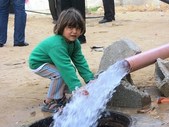
By Yousef M. Aljamal
Gaza The Gaza Strip, a 365-square-kilometer-coastal enclave, is home to one of the most densely populated communities in the world, where water has become a sacred source.
The nearly two million Palestinians in Gaza have 3% of water fit for human consumption, according to the latest statistics.
The future of water, and the reality for Palestinians seems dim. Mazin Gunaim, head of the Palestinian Water Authority said in a press conference held in Ramallah on May 5 2016 that “the aquifer in the Gaza Strip will not be fit for human use at the end of 2016.
The portion of water per person per day is 90 liters, which does not meet international standards, and much of it is polluted.” The United Nations’ report, Gaza in 2020: A liveable Place, published in August 2012 stated: “Today 90% of water from the aquifer is not safe for drinking, without treatment.
Availability of clean water is thus limited for most Gazans with an average consumption of 70 to 90 litres per person per day (depending on the season), below the global WHO standard of 100 litres per person per day.”
According to the Palestinian Water Authority, some 10,000 Gaza residents do not have taps in or near their homes, and about one million people do not have continuous access to water.
“The whole water system needs to be improved. There is a serious lack of water which is undrinkable in most cases,” Bisan Aljadili, a student at the Islamic University of Gaza, from Alnusierat refugee camp, told the Palestine Chronicle.
The Israeli occupation also denies entry of equipment and supplies needed for the construction, maintenance and operation of water and sanitation facilities to the besieged Gaza Strip.
The lack of water supply is one more tragedy the Palestinian people suffer. Yet, they have no choice but to adapt to the situation in order to survive, amid the tough conditions in the Gaza Strip.
“There are three major problems: the scarcity of water and the over use of the aquifer, the pollution of water by nitrates, and the seawater intrusion to the groundwater,” Bilal Alqidra, a water engineer from Khan Younis, told the Palestine Chronicle.
“We don’t have water desalination; sewage water is not treated, in addition to the issue of lack of electricity.
Even clean water which people purchase is not well monitored by the relevant authorities. Vehicles used to distribute clean water is not clean enough,” he added.
The Coastal Municipalities Water Utility, which runs several water projects across the Gaza Strip, has a message to share with the world: “Remove the blockade imposed on the water sector and improve energy provided to feed the water system.
The blockade and power cuts negatively impact the implementation of water projects needed to improve water quality in the Gaza Strip.” – Yousef M. Aljamal is the Correspondent of the Palestine Chronicle in the Gaza Strip.
Gaza The Gaza Strip, a 365-square-kilometer-coastal enclave, is home to one of the most densely populated communities in the world, where water has become a sacred source.
The nearly two million Palestinians in Gaza have 3% of water fit for human consumption, according to the latest statistics.
The future of water, and the reality for Palestinians seems dim. Mazin Gunaim, head of the Palestinian Water Authority said in a press conference held in Ramallah on May 5 2016 that “the aquifer in the Gaza Strip will not be fit for human use at the end of 2016.
The portion of water per person per day is 90 liters, which does not meet international standards, and much of it is polluted.” The United Nations’ report, Gaza in 2020: A liveable Place, published in August 2012 stated: “Today 90% of water from the aquifer is not safe for drinking, without treatment.
Availability of clean water is thus limited for most Gazans with an average consumption of 70 to 90 litres per person per day (depending on the season), below the global WHO standard of 100 litres per person per day.”
According to the Palestinian Water Authority, some 10,000 Gaza residents do not have taps in or near their homes, and about one million people do not have continuous access to water.
“The whole water system needs to be improved. There is a serious lack of water which is undrinkable in most cases,” Bisan Aljadili, a student at the Islamic University of Gaza, from Alnusierat refugee camp, told the Palestine Chronicle.
The Israeli occupation also denies entry of equipment and supplies needed for the construction, maintenance and operation of water and sanitation facilities to the besieged Gaza Strip.
The lack of water supply is one more tragedy the Palestinian people suffer. Yet, they have no choice but to adapt to the situation in order to survive, amid the tough conditions in the Gaza Strip.
“There are three major problems: the scarcity of water and the over use of the aquifer, the pollution of water by nitrates, and the seawater intrusion to the groundwater,” Bilal Alqidra, a water engineer from Khan Younis, told the Palestine Chronicle.
“We don’t have water desalination; sewage water is not treated, in addition to the issue of lack of electricity.
Even clean water which people purchase is not well monitored by the relevant authorities. Vehicles used to distribute clean water is not clean enough,” he added.
The Coastal Municipalities Water Utility, which runs several water projects across the Gaza Strip, has a message to share with the world: “Remove the blockade imposed on the water sector and improve energy provided to feed the water system.
The blockade and power cuts negatively impact the implementation of water projects needed to improve water quality in the Gaza Strip.” – Yousef M. Aljamal is the Correspondent of the Palestine Chronicle in the Gaza Strip.
11 may 2016
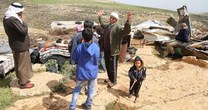
Israeli Occupation Forces (IOF) Tuesday razed a Palestinian home under construction in al-Weljeh village to the west of Bethlehem and handed over stop of construction notices to owners of five homes in addition to a water line in al-Aqabeh village east of Tubas in the northern Jordan Valley.
Majdi Abu al-Tin, secretary of al-Weljeh village council, revealed that the IOF claimed that the home was demolished because of lacking construction permit. As for Tubas, the official of Jordan Valley’s file Mutaz Bsharat underlined that Israeli forces distributed Tuesday morning notices ordering owners of five homes and a water line to stop the construction processes in their properties.
The 3-kilometer-long water line project was aimed at supplying al-Aqabah village, which lacks water sources, with potable water. The inhabitants of the village transfer water in tanks that cost them a lot of money, he pointed out.
Majdi Abu al-Tin, secretary of al-Weljeh village council, revealed that the IOF claimed that the home was demolished because of lacking construction permit. As for Tubas, the official of Jordan Valley’s file Mutaz Bsharat underlined that Israeli forces distributed Tuesday morning notices ordering owners of five homes and a water line to stop the construction processes in their properties.
The 3-kilometer-long water line project was aimed at supplying al-Aqabah village, which lacks water sources, with potable water. The inhabitants of the village transfer water in tanks that cost them a lot of money, he pointed out.
9 may 2016
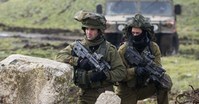
Israeli Occupation Forces (IOF) on Sunday banned Palestinians from continuing work on a European-financed project opening a water channel for inhabitants of a hamlet east of Tubas in the northern Jordan Valley.
Local sources told the PIC reporter that the project aimed at providing the hamlet with water, since it has no water sources, by opening a 4.5-kilometer long channel.
The hamlet’s inhabitants, 256 individuals of 38 families, have been suffering from tough living conditions under which they have to use water tanks.
Local sources told the PIC reporter that the project aimed at providing the hamlet with water, since it has no water sources, by opening a 4.5-kilometer long channel.
The hamlet’s inhabitants, 256 individuals of 38 families, have been suffering from tough living conditions under which they have to use water tanks.
3 may 2016

Yoav Mordechi becomes General of the COGAT Unit
Gaza doesn't have enough electricity to run its water treatment plants, so it's dumping its sewage into the sea, threatening the Israeli coastline. Palestinian political infighting is a major factor keeping the electricity off.
Each day, millions of gallons of raw sewage pour into the Gaza Strip's Mediterranean beachfront, spewing out of a metal pipe and turning miles of once-scenic coastline into a stagnant dead zone.
The sewage has damaged Gaza's limited fresh water supplies, decimated fishing zones, and after years of neglect, is now floating northward and affecting Israel as well, where a nearby desalination plant was forced to shut down, apparently due to pollution.
"It's certain that Gaza Strip's beaches are completely polluted and unsuitable for swimming and entertainment, especially in the summer," said Ahmed Yaqoubi of the Palestinian Water Authority.
Environmentalists and international aid organizations say that if the problem isn't quickly addressed, it could spell even more trouble on both sides of the border.
But while Israel has a clear interest in Gazans repairing their water infrastructure, that would likely require it to ease restrictions on the import of building materials -- which it fears the territory's Hamas rulers could divert for military purposes -- and increase the amount of electricity it sells to Gaza.
Poor sewage treatment in Gaza is the result of a rapidly expanding population, an infrastructure damaged during wars with Israel and a chronic shortage of electricity to run the wastewater plants that still function. In 2007, a sewage reservoir overflowed in a village in northern Gaza, drowning five people.
An Israeli blockade that has restricted imports, coupled with Palestinian infighting and mismanagement by the Hamas-run government, has compounded the problems for the enclave's 1.8 million residents. Israel and Egypt have maintained a blockade of Gaza since Hamas, an Islamic militant group. committed to Israel's destruction, seized power in 2007
Nasser Abu Saif said he was once happy to live in a beachfront apartment in Shati refugee camp. Now, he avoids swimming in the fetid water near his house.
"There are mosquitoes in the summer and even in the winter," he said. "It makes our lives unpleasant."
Several aid groups have attempted to solve the sewage problem.
Steen Jorgensen, country director for the World Bank in the West Bank and Gaza Strip, said the fatal sewage flood spurred his office to build a $73 million sewage treatment plant nine years ago. He said the facility, meant to treat at least one-fifth of Gaza's sewage, would already be operational if it had a reliable power supply.
Disagreements between Hamas and the West Bank-based Palestinian Authority over fuel taxes have left Gaza's only power plant functioning at reduced capacity. Electricity from neighboring Israel and Egypt help alleviate the shortages, but usually there are only six to eight hours of power each day.
"That's just not reliable enough for a sewage plant," said Jorgensen. He said foreign donors, including the United States, have offered to fund a power supply to the plant, but he said Israel has not agreed to run a dedicated electricity line. Other options have not been found.
COGAT, the Israeli defense body responsible for Palestinian affairs, said Israel supplies 125 to 140 megawatts of power a day to the Gaza Strip. "The decision of distributing the electricity falls under the responsibility of the Palestinians," COGAT wrote. In all, Gaza needs some 400 megawatts for its daily needs.
Jorgensen said the World Bank plans to start running the plant in the coming months using backup diesel generators, which will increase the cost and leave sewage treatment vulnerable to fuel shortages. He said the plant will also have solar panels, but they will only generate a fraction of the needed power.
"If we don't get this operational, then I think it's going to be very hard to raise money for other necessary projects in Gaza," Jorgensen said.
The German state-owned development bank KfW has funded the $20 million rehabilitation of an older sewage plant in Gaza, according to Jonas Blume, director of its West Bank office. Blume said the plant can only run half-days due to lack of power.
Construction is scheduled to begin in August on an additional facility in central Gaza that could handle the sewage of up to 1 million people, Blume added. But he said Israeli security restrictions have slowed the work.
"At the end we get most of the material in, but it's a struggle, it takes time, and it causes delay, which leads to extra costs," he said.
COGAT said deliveries of cement and wood have been suspended or slowed because Hamas diverts materials for terror purposes.
The delays in sewage treatment are exacerbating a water crisis. Years of overdrawing Gaza's underground aquifer have allowed seawater to infiltrate into its only source of drinking water. Sewage flows into the aquifer as well.
"We can say that 100 percent of the water is not potable," said the Water Authority's Yaqoubi. More than 150 private water purification businesses have proliferated across Gaza to offer clean drinking water, he said.
Eitemad Abu Khader lives with her four daughters in a cinderblock home surrounded by corrugated zinc north of Gaza City. Sewage collects in huge ponds next to their neighborhood. Abu Khader said she cannot afford purified water. Instead, she and her daughters drink tap water and bear the consequences.
"I spend my time from doctor to doctor, hospital to hospital," she said. "My daughters always have rashes."
On a recent afternoon, her oldest daughter, six-year-old Fayza, sat scratching her arm as insects hovered around them.
There are signs that the problem is now beginning to affect Israel.
Israeli Water Authority spokeswoman Ilana Keren said a desalination plant near Ashkelon, about 10 kilometers (6 miles) north of Gaza, was shut in January and February "because of the quality of the raw water."
In a statement, Israel's Environment Ministry said it closely monitors the Gaza sewage situation. Most of the waste is consumed by algae but a buildup of algae can block filters at the desalination plant, it said, adding that a recent check of the water quality off Ashkelon found the beaches suitable for bathing.
Gidon Bromberg, the Israeli director of the environmental group EcoPeace Middle East, said "there's no doubt" that waste from Gaza caused the plant's problems. "There's no other source," he said.
Bromberg warned that cholera, typhoid or other pandemic diseases could easily cross into Israel via the shared underground aquifer and the sea.
"It's a single shared bathtub," Bromberg said. "There's 101 different ways for these bacterium to be transferred."
Ashkelon deputy mayor Yoram Shefer said he fears that without a wider political settlement, the sewage issue will not improve, even though he said the water is safe enough to swim in.
"The Mediterranean sea is big. Not all (sewage) goes to Ashkelon," he said.
Gaza doesn't have enough electricity to run its water treatment plants, so it's dumping its sewage into the sea, threatening the Israeli coastline. Palestinian political infighting is a major factor keeping the electricity off.
Each day, millions of gallons of raw sewage pour into the Gaza Strip's Mediterranean beachfront, spewing out of a metal pipe and turning miles of once-scenic coastline into a stagnant dead zone.
The sewage has damaged Gaza's limited fresh water supplies, decimated fishing zones, and after years of neglect, is now floating northward and affecting Israel as well, where a nearby desalination plant was forced to shut down, apparently due to pollution.
"It's certain that Gaza Strip's beaches are completely polluted and unsuitable for swimming and entertainment, especially in the summer," said Ahmed Yaqoubi of the Palestinian Water Authority.
Environmentalists and international aid organizations say that if the problem isn't quickly addressed, it could spell even more trouble on both sides of the border.
But while Israel has a clear interest in Gazans repairing their water infrastructure, that would likely require it to ease restrictions on the import of building materials -- which it fears the territory's Hamas rulers could divert for military purposes -- and increase the amount of electricity it sells to Gaza.
Poor sewage treatment in Gaza is the result of a rapidly expanding population, an infrastructure damaged during wars with Israel and a chronic shortage of electricity to run the wastewater plants that still function. In 2007, a sewage reservoir overflowed in a village in northern Gaza, drowning five people.
An Israeli blockade that has restricted imports, coupled with Palestinian infighting and mismanagement by the Hamas-run government, has compounded the problems for the enclave's 1.8 million residents. Israel and Egypt have maintained a blockade of Gaza since Hamas, an Islamic militant group. committed to Israel's destruction, seized power in 2007
Nasser Abu Saif said he was once happy to live in a beachfront apartment in Shati refugee camp. Now, he avoids swimming in the fetid water near his house.
"There are mosquitoes in the summer and even in the winter," he said. "It makes our lives unpleasant."
Several aid groups have attempted to solve the sewage problem.
Steen Jorgensen, country director for the World Bank in the West Bank and Gaza Strip, said the fatal sewage flood spurred his office to build a $73 million sewage treatment plant nine years ago. He said the facility, meant to treat at least one-fifth of Gaza's sewage, would already be operational if it had a reliable power supply.
Disagreements between Hamas and the West Bank-based Palestinian Authority over fuel taxes have left Gaza's only power plant functioning at reduced capacity. Electricity from neighboring Israel and Egypt help alleviate the shortages, but usually there are only six to eight hours of power each day.
"That's just not reliable enough for a sewage plant," said Jorgensen. He said foreign donors, including the United States, have offered to fund a power supply to the plant, but he said Israel has not agreed to run a dedicated electricity line. Other options have not been found.
COGAT, the Israeli defense body responsible for Palestinian affairs, said Israel supplies 125 to 140 megawatts of power a day to the Gaza Strip. "The decision of distributing the electricity falls under the responsibility of the Palestinians," COGAT wrote. In all, Gaza needs some 400 megawatts for its daily needs.
Jorgensen said the World Bank plans to start running the plant in the coming months using backup diesel generators, which will increase the cost and leave sewage treatment vulnerable to fuel shortages. He said the plant will also have solar panels, but they will only generate a fraction of the needed power.
"If we don't get this operational, then I think it's going to be very hard to raise money for other necessary projects in Gaza," Jorgensen said.
The German state-owned development bank KfW has funded the $20 million rehabilitation of an older sewage plant in Gaza, according to Jonas Blume, director of its West Bank office. Blume said the plant can only run half-days due to lack of power.
Construction is scheduled to begin in August on an additional facility in central Gaza that could handle the sewage of up to 1 million people, Blume added. But he said Israeli security restrictions have slowed the work.
"At the end we get most of the material in, but it's a struggle, it takes time, and it causes delay, which leads to extra costs," he said.
COGAT said deliveries of cement and wood have been suspended or slowed because Hamas diverts materials for terror purposes.
The delays in sewage treatment are exacerbating a water crisis. Years of overdrawing Gaza's underground aquifer have allowed seawater to infiltrate into its only source of drinking water. Sewage flows into the aquifer as well.
"We can say that 100 percent of the water is not potable," said the Water Authority's Yaqoubi. More than 150 private water purification businesses have proliferated across Gaza to offer clean drinking water, he said.
Eitemad Abu Khader lives with her four daughters in a cinderblock home surrounded by corrugated zinc north of Gaza City. Sewage collects in huge ponds next to their neighborhood. Abu Khader said she cannot afford purified water. Instead, she and her daughters drink tap water and bear the consequences.
"I spend my time from doctor to doctor, hospital to hospital," she said. "My daughters always have rashes."
On a recent afternoon, her oldest daughter, six-year-old Fayza, sat scratching her arm as insects hovered around them.
There are signs that the problem is now beginning to affect Israel.
Israeli Water Authority spokeswoman Ilana Keren said a desalination plant near Ashkelon, about 10 kilometers (6 miles) north of Gaza, was shut in January and February "because of the quality of the raw water."
In a statement, Israel's Environment Ministry said it closely monitors the Gaza sewage situation. Most of the waste is consumed by algae but a buildup of algae can block filters at the desalination plant, it said, adding that a recent check of the water quality off Ashkelon found the beaches suitable for bathing.
Gidon Bromberg, the Israeli director of the environmental group EcoPeace Middle East, said "there's no doubt" that waste from Gaza caused the plant's problems. "There's no other source," he said.
Bromberg warned that cholera, typhoid or other pandemic diseases could easily cross into Israel via the shared underground aquifer and the sea.
"It's a single shared bathtub," Bromberg said. "There's 101 different ways for these bacterium to be transferred."
Ashkelon deputy mayor Yoram Shefer said he fears that without a wider political settlement, the sewage issue will not improve, even though he said the water is safe enough to swim in.
"The Mediterranean sea is big. Not all (sewage) goes to Ashkelon," he said.
15 apr 2016
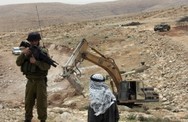
Israeli forces, on Thursday, demolished a rainwater harvesting well near al-Arrub refugee camp, north of Hebron city, in the southern West Bank, said a local activist.
Local activist Muhammad Awad said that a bulldozers, escorted by Israeli forces and “Civil Administration” officers, stormed Abu Suda locality, opposite to Biet al-Braka church compound, north of the camp, and demolished a Palestinian-owned rainwater harvesting well.
The well-owner was identified as Saleh Nimer, from the refugee camp.
This came about three months after forces demolished the retaining wall that used to surround Saleh’s plot of land and uprooted him olive trees and grape vines.
Local activist Muhammad Awad said that a bulldozers, escorted by Israeli forces and “Civil Administration” officers, stormed Abu Suda locality, opposite to Biet al-Braka church compound, north of the camp, and demolished a Palestinian-owned rainwater harvesting well.
The well-owner was identified as Saleh Nimer, from the refugee camp.
This came about three months after forces demolished the retaining wall that used to surround Saleh’s plot of land and uprooted him olive trees and grape vines.

The Israeli Occupation Authority (IOA) issued a decision to confiscate over 2400 dunums of Palestinians’ lands in al-Zauya village to the west of Salfit and Senneirya village to the south of Qalqilya.
Al-Zauya municipality president Naem Shqair told the PIC reporter that the municipality has not received the maps which demonstrate the coordinates of the confiscated lands yet, and said that contacts with the civil liaison and the governorate along with the security authorities and the Separation Wall and Settlement Affairs Committee have been made in order to prevent the implementation of the decision.
He pointed out that most lands affected by the Israeli confiscation order are agricultural lands in which projects are being implemented and contain agricultural wells.
Al-Zauya municipality president Naem Shqair told the PIC reporter that the municipality has not received the maps which demonstrate the coordinates of the confiscated lands yet, and said that contacts with the civil liaison and the governorate along with the security authorities and the Separation Wall and Settlement Affairs Committee have been made in order to prevent the implementation of the decision.
He pointed out that most lands affected by the Israeli confiscation order are agricultural lands in which projects are being implemented and contain agricultural wells.
9 apr 2016
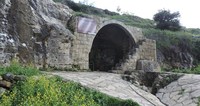
Palestinian farmers in Salfit complained about pollution of water and plants due to Israeli Ariel’s sewage which ends in al-Matwi valley to the west of the city.
The farmers complained in particular about the smell of sewage, large numbers of pigs and insects which pollute water springs and agricultural lands and cause lots of diseases to plants of the season.
Researcher Khaled Maali warned of the dangerous flow of sewage water into the groundwater and springs which constitutes an environmental problem.
Maali called on the environmental institutions to pressure the Israeli occupation authorities in order to halt polluting Palestinian resources and environment.
The farmers complained in particular about the smell of sewage, large numbers of pigs and insects which pollute water springs and agricultural lands and cause lots of diseases to plants of the season.
Researcher Khaled Maali warned of the dangerous flow of sewage water into the groundwater and springs which constitutes an environmental problem.
Maali called on the environmental institutions to pressure the Israeli occupation authorities in order to halt polluting Palestinian resources and environment.
28 mar 2016
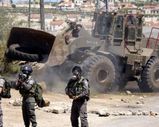
Israeli soldiers invaded, on Monday at dawn, an area north of the West Bank city of Bethlehem, demolished a home, a playground, electricity and water networks, in addition to uprooting farmlands, belonging to a Palestinian family.
The demolished properties belong to a Palestinian, identified as Khader Nimir al-Jarashi, after the Israeli army claimed they were built without permits.
Khader said more than 50 Israeli military vehicles, and four armored bulldozers invaded the area, and demolished his home, in addition to its surrounding walls, located close to military roadblock #300.
He added that the soldiers also demolished his bird farm, and a playground used for tennis and basketball, in addition to bulldozing his farmland, and uprooted many trees.
The soldiers also destroyed electricity and water networks, providing his properties, and nearby areas, with the needed power and water.
The invaded area and demolished properties, are close to a main road used by Israeli colonizers in the occupied West Bank, and the army.
The demolished properties belong to a Palestinian, identified as Khader Nimir al-Jarashi, after the Israeli army claimed they were built without permits.
Khader said more than 50 Israeli military vehicles, and four armored bulldozers invaded the area, and demolished his home, in addition to its surrounding walls, located close to military roadblock #300.
He added that the soldiers also demolished his bird farm, and a playground used for tennis and basketball, in addition to bulldozing his farmland, and uprooted many trees.
The soldiers also destroyed electricity and water networks, providing his properties, and nearby areas, with the needed power and water.
The invaded area and demolished properties, are close to a main road used by Israeli colonizers in the occupied West Bank, and the army.
23 mar 2016
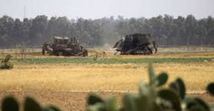
Israeli soldiers invaded, Tuesday, the Soba area, east of Ethna town, west of the southern West Bank city of Hebron, bulldozed and uprooted 40 Dunams of farmlands, to prepare for building a gravel factory in an illegal colony, and demolished a barn in the al-Beetan area, in Masafer Yatta, south of Hebron.
Abdul-Rahman Tmeizi, head of the Public Relations Department in Ethna Local Council, said the soldiers bulldozed the Palestinian lands in preparation for constructing a gravel factory for an illegal colony, built on Palestinian lands.
Tmeizi added that the Israel continues to rob the Palestinians of their natural resources, and lands, especially since that area has some of the best resources of gravel and natural construction materials that are also used in paving roads.
Rateb Jabour, the coordinator of the Popular Committee against the Wall and Settlements in southern Hebron, said that soldiers also invaded the Tabban village, and demolished a barn belonging to Nasser Khalil Abu ‘Obeid.
Jabour said the army has recently demolished many barns, sheds, wells and solar panels, and is preventing the shepherds from herding their cattle in Masafer Yatta area, under the pretext of a "closed military zone."
Abdul-Rahman Tmeizi, head of the Public Relations Department in Ethna Local Council, said the soldiers bulldozed the Palestinian lands in preparation for constructing a gravel factory for an illegal colony, built on Palestinian lands.
Tmeizi added that the Israel continues to rob the Palestinians of their natural resources, and lands, especially since that area has some of the best resources of gravel and natural construction materials that are also used in paving roads.
Rateb Jabour, the coordinator of the Popular Committee against the Wall and Settlements in southern Hebron, said that soldiers also invaded the Tabban village, and demolished a barn belonging to Nasser Khalil Abu ‘Obeid.
Jabour said the army has recently demolished many barns, sheds, wells and solar panels, and is preventing the shepherds from herding their cattle in Masafer Yatta area, under the pretext of a "closed military zone."
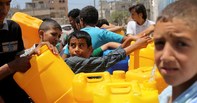
A Palestinian report showed that the individual portion of water in Gaza has declined from 91.3 liters daily in 2013 to 79.7 liters in 2014.
Over 97% of water in the coastal enclave is not compatible with standards of the World Health Organization for drinking water, the report added.
The report which was prepared mutually by the Palestinian central statistics department and the Palestinian authority of water and issued on the World Day of Water on March 22, revealed that Gazan people receive the minimum level recommended by the same organization which is 100 liters per day for the individual.
Israeli forces control most sources of water in the area and prevent Palestinians from accessing those sources. Israeli practices as well prevent the establishment of sewage treatment stations, the report stated. It was also pointed out in the report that Palestinians have to buy water from the Israeli water company, Mekorot.
The purchased water reached to 63.5 million cubic meters in 2014 with a percentage of 18.5% of the available water.
Over 97% of water in the coastal enclave is not compatible with standards of the World Health Organization for drinking water, the report added.
The report which was prepared mutually by the Palestinian central statistics department and the Palestinian authority of water and issued on the World Day of Water on March 22, revealed that Gazan people receive the minimum level recommended by the same organization which is 100 liters per day for the individual.
Israeli forces control most sources of water in the area and prevent Palestinians from accessing those sources. Israeli practices as well prevent the establishment of sewage treatment stations, the report stated. It was also pointed out in the report that Palestinians have to buy water from the Israeli water company, Mekorot.
The purchased water reached to 63.5 million cubic meters in 2014 with a percentage of 18.5% of the available water.
20 mar 2016
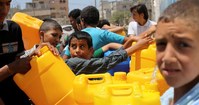
The water authority in Gaza has warned that the besieged enclave suffers from a severe water shortage in its coastal aquifer, which is the primary source for getting water.
This came during "an interview with an official," which was organized on Sunday by the government's information office in Gaza City in the presence of a reporter from the Palestinian Information Center (PIC).
Head of the water authority Yaser al-Shanti described the water situation in Gaza as very dangerous and said that international and local reports confirmed the gravity of the situation in recent years.
"The Strip is suffering from an acute shortage of water in quantity and quality, and recent UN reports on its water situation have confirmed that," Shanti said.
Replying to a question raised by the PIC reporter about the reason that caused the water crisis to escalate, the official said that Israel's blockade on Gaza and its persistence in stealing water from the aquifers of Gaza and the West Bank contributed to increasing water shortages.
He also accused the Israeli government of refusing to engage in any talks with the Palestinian side to end the water crisis. Shanti also stressed the importance of ending the blockade on Gaza and working on carrying out strategic water projects in order to address the problem.
This came during "an interview with an official," which was organized on Sunday by the government's information office in Gaza City in the presence of a reporter from the Palestinian Information Center (PIC).
Head of the water authority Yaser al-Shanti described the water situation in Gaza as very dangerous and said that international and local reports confirmed the gravity of the situation in recent years.
"The Strip is suffering from an acute shortage of water in quantity and quality, and recent UN reports on its water situation have confirmed that," Shanti said.
Replying to a question raised by the PIC reporter about the reason that caused the water crisis to escalate, the official said that Israel's blockade on Gaza and its persistence in stealing water from the aquifers of Gaza and the West Bank contributed to increasing water shortages.
He also accused the Israeli government of refusing to engage in any talks with the Palestinian side to end the water crisis. Shanti also stressed the importance of ending the blockade on Gaza and working on carrying out strategic water projects in order to address the problem.
